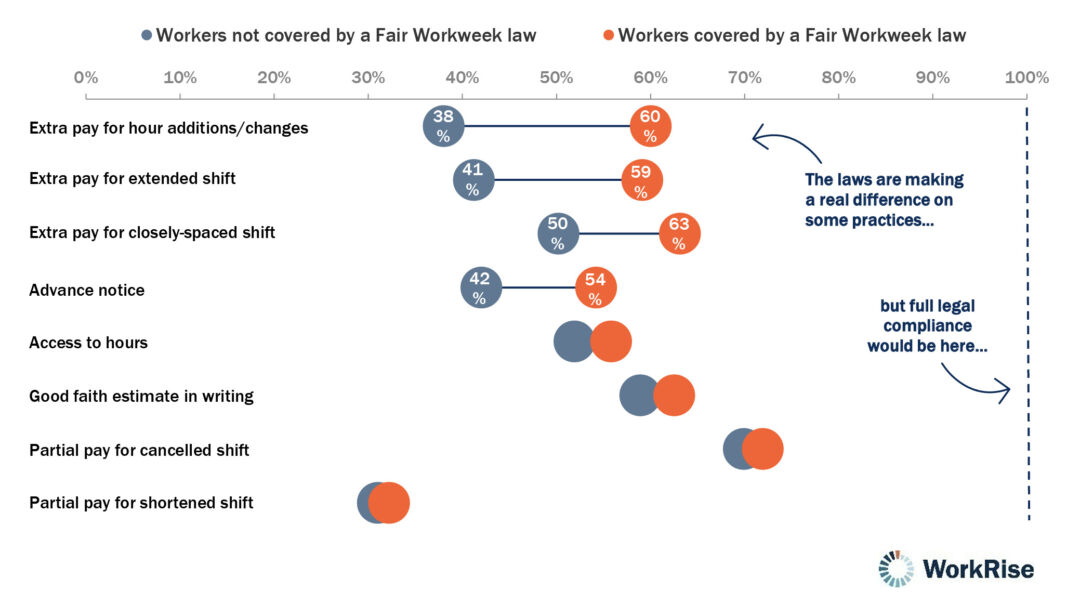How Are Workers Experiencing Fair Workweek Laws? Evidence for policymakers and advocates

This factsheet, “How Are Workers Experiencing Fair Workweek Laws? Evidence for policymakers and advocates,” originally appeared on WorkRise at https://www.workrisenetwork.org/sites/default/files/2025-08/howareworkersexperiencingfairworkweeklaws.pdf.
New laws that regulate employer scheduling practices have been enacted in ten US localities over the last decade. Known as Fair Workweek laws, these rules target industries in which a large proportion of employees are in lower paid jobs and face the constant uncertainty of fluctuating, unpredictable hours, such as retail and food service. The local laws address similar dimensions of work schedules, but the specific industries, size and type of employer, and administrative rules that define compliance vary by locality. Adapted from the brief, How Are Municipal-Level Fair Workweek Laws Playing Out on the Ground? Experiences of Food Service and Retail Workers in Three Cities, the chart below shows how workers are experiencing Fair Workweek laws in Chicago, Seattle, and New York City.
Figure 1
Fair Workweek Laws Are Improving Some—But Not All—Scheduling Practices
Share of retail and food service workers experiencing practices in alignment with scheduling laws, by coverage

What can policymakers do?
For policymakers in cities that have already approved Fair Workweek laws, implementation is the critical next step. These cities can support effective implementation by adopting easy-to-understand rules that encourage employer compliance, strengthen enforcement by city agencies, and educate employees and employers on their rights and responsibilities under Fair Workweek laws. In cities that have not yet adopted comprehensive Fair Workweek legislation, policymakers can still take meaningful steps by providing incentives to employers for adopting high-road scheduling practices, setting up a hotline for employees to report problematic scheduling experiences, and assembling information to inform future Fair Workweek legislation. Specific actions include:
- Bolster funding to labor enforcement offices. Labor enforcement offices across the country face chronic funding shortages. Without adequate staffing, they lack capacity for proactive investigations, community outreach, and enforcing full compliance with Fair Workweek laws.
- Launch education campaigns to help employers understand that it is illegal to not comply with Fair Workweek laws. Compliance is the responsibility of employers, not workers. To strengthen adherence with Fair Workweek laws, cities should work closely with employers to address barriers to the implementation of Fair Workweek provisions at local worksites, such as providing training modules and sample workplace practices to equip all managers with the knowledge and tools they need to implement Fair Workweek protections effectively.
- Launch education campaigns to help workers know if and how they are covered by Fair Workweek laws. Because geographic boundaries governing coverage of Fair Workweek laws can be blurry and the types of jobs covered may be misunderstood, workers may not know they are protected by their local law. Cities should launch informational campaigns to confirm coverage areas, provide hotlines for people to ask questions and report violations, post FAQs in plain language, and highlight high-road employers who proactively inform their workers.
- Give added attention to Fair Workweek provisions that are furthest from full compliance. Policymakers should investigate the specific areas of non-compliance in their local Fair Workweek law, paying particular attention to provisions with the lowest rates of compliance. This information can be used to educate employers and employees on legal requirements and to refine administrative rules that impede effective implementation on the ground.
- Simplify Fair Workweek laws by restricting the number of exemptions for premium pay. Some municipalities offer covered employers exemptions that allow them to avoid paying employees a premium for schedule changes. These exemptions mean that workers may not be compensated when their employer requests or requires a change to their schedule—undermining the stated aims of the laws. The administrative rules defining these exemptions are complex, further impeding policy goals by complicating implementation for on-site managers, enforcement by city officials, and understanding by employees.
For more insights on these findings, see the full report How Are Municipal-Level Fair Workweek Laws Playing Out on the Ground? Experiences of Food Service and Retail Workers in Three Cities at urbn.is/WRFWW
This summary was funded by WorkRise, a research-to-action network hosted by Urban Institute and supported by a multifunder collaborative. Our philanthropic supporters make it possible for WorkRise and Urban to advance their shared missions of bringing high-quality evidence to changemakers with the power to transform economic opportunity for all. The views expressed are those of the authors and should not be attributed to WorkRise or to the Urban Institute, its trustees, or its funders. Funders do not determine research findings or the insights and recommendations of Urban experts. Further information on the Urban Institute’s funding principles is available at urban.org/fundingprinciples.
Did you find this content informative and engaging?
Get updates and stay in tune with U.S. economic inequality and growth!




Stay updated on our latest research